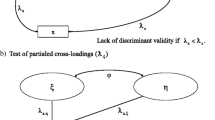Abstract
Opponents of ceteris paribus laws are apt to complain that the laws are vague and untestable. Indeed, claims to this effect are made by Earman, Roberts and Smith in this volume. I argue that these kinds of claims rely on too narrow a view about what kinds of concepts we can and do regularly use in successful sciences and on too optimistic a view about the extent of application of even our most successful non-ceteris paribus laws. When it comes to testing, we test ceteris paribus laws in exactly the same way that we test laws without the ceteris paribus antecedent. But at least when the ceteris paribus antecedent is there we have an explicit acknowledgment of important procedures we must take in the design of the experiments — i.e., procedures to control for “all interferences” even those we cannot identify under the concepts of any known theory.
Similar content being viewed by others
REFERENCES
Anscombe, G. E. M.: 1971, Causality and Determination, Cambridge University Press, Cambridge.
Cartwright, N.: 1988, ‘Capacities and Abstractions’ in P. Kitcher and W. Salmon (eds), Minnesota Studies in the Philosophy of Science, Vol. XIII: Scientific Explanation, University of Minnesota Press, Minneapolis, MN, pp. 349–355.
Cartwright, N.: 1989, Nature's Capacities and their Measurement, Clarendon Press, Oxford.
Cartwright, N.: 1999, The Dappled World, Cambridge University Press, Cambridge.
Cartwright, N.: 2000, ‘Against the Completability of Science’ in M. W. F. Stone and J. Wolff (eds), The Proper Ambition of Science, Routledge, London, 209–222.
Earman, J., J. Roberts, and S. Smith: (this issue), ‘“Ceteris Paribus” Lost’ Erkenntnis, this issue.
Freud, S.: 1909, ‘Notes Upon a Case of Obsessional Neurosis’ in P. Rieff (ed.), Three Case Histories, Vol. 7 of The Collected Papers of Sigmund Freud, Collier Books, New York, 1963.
Glanvill, J.: 1661, The Vanity of Dogmatizing, printed by E.C. for Henry Eversden, London.
Hempel, C. G.: 1966, Philosophy of Natural Science, Prentice Hall, Englewood-Cliffs, CA.
Hoover, K. D.: 2001, Causality in Macroeconomics, Cambridge University Press, Cambridge.
Mach, E.: 1893, The Science of Mechanics, Open Court, La Salle, IL.
Ryle, G.: 1949, The Concept of Mind, Hutchinson, London.
Winsberg, E., M. Frisch, K.M. Darling, and A. Fine: 2000, ‘Review of Cartwright (1999)’ Journal of Philosophy 97, 403–408.
Author information
Authors and Affiliations
Rights and permissions
About this article
Cite this article
Cartwright, N. In Favor of Laws that Are Not Ceteris Paribus After All. Erkenntnis 57, 425–439 (2002). https://doi.org/10.1023/A:1021550815652
Issue Date:
DOI: https://doi.org/10.1023/A:1021550815652




